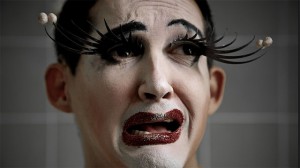Now in its sixteenth year, the San Francisco Transgender Film Festival (formerly known as Tranny Fest) offers a mix of short and long-form films that celebrate the myriad experiences of people who are treated, when they are acknowledged at all, with disdain or murderous hate by society at large. One of festival’s co-founders, filmmaker Christopher Lee, committed suicide in December 2012 after years of struggling with depression and untreated mental illness. It is in his honor, and all those who seek recognition on their own terms, that this exciting collection of cinematic moments is presented.
Opening the festival is a spate of short films, none of which surpass 20 minutes, but most certainly pack an emotional and intellectual punch.In The Fiction of the Fix (Friday, November 8, 8pm, Roxie Theater), we witness actress Therese Garcia as the character August as she takes stock of previous failed relationships. But rather than wallowing in self pity and gallons of ice cream, she methodically conjures, falls in love with, and then squanders each relationship as the “perfection” of each partner gives way to all-too-human imperfection. The cycle is ritualistic, where it appears that August seeks something with each new paramour that simply can’t be called forth from the ether. Director Cathy Sitzes reinforces what we already know — partnerships, particularly the romantic kind, are messy affairs. The insight isn’t revelatory, but it is delivered here with ample charm.
Making or discovering oneself is a prominent theme in many of the festival’s offerings. Just as Walt Whitman’s poem “Song of Myself” (1855) portrays “self” as both the seeking individual and an assembly of multitudes, so too do these films touch on the private and public experiences of forging an identity that fits. Performing Girl features multi-talented Sri Lankan-American artist D’Lo and the story of how he came of age while navigating gender and identity questions, deeply entrenched cultural expectations, and the death of his sibling. D’Lo’s story will be familiar to many: knowing early in life that he did not “fit,” yet not knowing how to act as either male or female; the simultaneous joy and burden of shouldering parental dreams, and then mustering the will to live on his own terms. The film deftly combines animation, D’Lo’s hilarious live performances, and interviews with the artist and his parents, and reinforces the power of humor to inform difficult conversations. In Change Over Time, Ewan Duarte recounts the experience of transitioning from a female to male identity, both physically and psychologically, though the introduction of testosterone, or “T”, to his body. Gorgeous imagery of natural settings is overlaid by Duarte’s narration, which is drawn from the audio journal he maintained as his transition took place. What’s fascinating is hearing Duarte’s voice deepen as the days and weeks progress after the introduction of testosterone. If you’re curious to know the intimate details, the thoughts and hopes of a person in transition, this is film is for you. (Friday, November 8, 8pm, Roxie Theater)

Gender Games
At age 51, Gabbi Ludwig returned to school in order to realize a long-held goal of playing collegiate basketball. According to NCAA rules, if an athlete’s gender changes, they are eligible to participate in a team sport for which their eligibility long ago expired. Gender Games follows Gabbi through practices, made all the more grueling by age and time spent away from the sport, and interactions with her teammates and family. Gabbi and her partner wholly acknowledge the challenges posed by juggling work and school, family obligations, and one partner’s process of transition. They also stress that realizing Gabbi’s dream was absolutely worth the effort. The most heartening moments of this film come in watching Gabbi interact with her teammates. Not only was her skill and advantage as a 6-foot 7-inch player welcomed, Gabbi was wholly embraced… as a woman, who was once a man. That fact floored me, particularly because it demonstrates that we are capable of welcoming what is unfamiliar. Against the backdrop of collegiate and professional sports, which may generously be described as tacitly supporting rape culture, it is deeply satisfying to watch women athletes at work in building community and kicking ass on the court. (Friday, November 8, 8pm, Roxie Theater)




